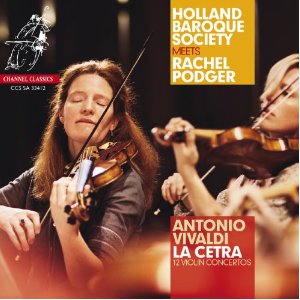A search for the best recording of a given set of Vivaldi violin concertos gets easier with every new release from Rachel Podger. Her last effort for Channel Classics, a scintillating recording of the 12 concertos of La Stravaganza (Op. 4) simply blew away the existing competition (click here for review), and this one promises to do the same. Not that there are that many complete traversals of all 12 of these concertos, but after these commanding performances, recorded with Channel Classics’ signature attention to realistic sound reproduction, future applicants need not apply.
Podger is a dynamic and unfailingly accurate virtuoso with exceptional interpretive instincts that can turn an unimposing rhythmic accent, a tiny melodic figure, or a seemingly routine harmonic progression into a moment of surprise or sheer wonder not only at the technical facility but also at the unexpected expressive effect. These concertos are full of challenges for the soloist, and Podger, who has considerable experience not only with Vivaldi, but with Mozart, Bach, and Haydn, has no apparent fear of any of them. And she also is a confident leader, bringing her very capable orchestral colleagues perfectly along with her, not only concerning tempos, but more importantly into her personal conception of dynamics, her volatile phrasing and often relentless rhythmic thrust. This is what makes these performances so exciting, invigorating, and so memorably different from the Vivaldi we’ve previously known and loved from performers such as Fabio Biondi, Giuliano Carmignola, and Andrew Manze.
There’s nothing not to like in terms of the music, and there are interesting little tidbits of trivia, such as the C minor theme of the Largo in Concerto No. 1, which bears an all-too-striking resemblance to the theme of Bach’s G minor fugue in Book 1 of the WTC. For some reason the first movement of the D minor concerto (No. 8) is foisted on many third or fourth-year violin students, perpetuating the idea that Vivaldi is “easier Bach”. Well, it isn’t. And just listen to Podger’s no-holds-barred performance and you’ll want to slap a warning label on the work: “For Adults Only”.
The Holland Baroque Society is a superb ensemble—it reminds me of the Quebec-based Les Violons du Roy—a group of young and very talented musicians whose inherent youthful energy and technical virtuosity, not to mention serious dedication to their music, reassures us older types that the future of classical music is secure. Full disclosure: I happened to be in Amsterdam during these recording sessions, and sat in for an all-too-brief period. I can say without qualification that the sound you hear is absolutely faithful to the superb acoustics of Amsterdam’s Waalse Kerk and to the vibrant timbres of the Holland Baroque Society’s period instruments. (A wonderful thing about these performances is the way the instruments themselves and their unique colors are celebrated and exploited—not just the bowed strings, but also the lute, organ, and harpsichord.) When listening to this CD I turned the volume up just slightly past my normal listening level, and I was rewarded with a room-filling reproduction of what I’d heard in Amsterdam. “Uitstekend!” Highly recommended.
































